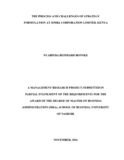| dc.description.abstract | Many operating business environments in this modern world are delineated by rapid
dynamisms both from internal and external fronts. Businesses must, thence, come up with
dynamic and appropriate strategies to respond accordingly so as to ensure they stay
afloat.Strategy formulation forms a very critical component of the strategic management
process. To that regard, therefore, it involves systematically arranging one's ideas and
thoughts with a lot of precision and putting into documentation the logically developed
and thought about strategies. Ideally, it is the fundamental stage of strategic management
process in which firms use various resources to accomplish objectives of the strategy and
goals of the company as a whole. It is worth noting that the ability to come up with,
develop, and effectively document strategies successfully is imperative to any
organisation. Despite the importance of the formulation process in strategic management,
it is often overshadowed or overlooked by the implementation or monitory and evaluation
stages. In view of this, this research study, set out to address two main objectives which
were to establish strategy formulation process adopted by Simba Corporation and to
determine the challenges experienced by the Company in strategy formulation
process.The study adopted case study where senior staff were interviewed and their
responses analyzed through content analysis method. An analysis of various literatures on
strategy formulation did reveal that there is limited knowledge on how strategies should
ideally be formulated. This can, hence, be deduced that there is no standard formula or
procedure for doing the same. At the same time, various scholars indeed presented
varying reasons as challenges to strategy formulation. The study further identified several
challenges to strategy formulation including resistance to change, deep rooted culture,
conflict of interest, ideological differences, market and customers' expectation,
government and legislation, market liberalization, globalization, ethics, communication,
and inadequacy of resources among others. The study also found that the Company had
adopted diversification as its main strategyin its quest to being one of the major players in
the Motor Industry in Kenya. Other sources of data including but not limited to research
articles and other secondary company data sources were also very instrumental in this
study for purposes of data collection. The findings of this research work indeed
contribute to theory and knowledge by clearly underlining strategy formulation process
and challenges experienced therein. In addition, this study can be of great interest to
managers in the automobile sector as it underlines the need for management to deeply
understand their operating environment in order to formulate sound and appropriate
strategies that will not only ensure their survival but also growth and profitability within
the motor industry thereby positioning them strategically. The study concluded that for
organization to survive in the dynamic business environment, it must identify challenges
posing hurdles to strategy formulation and come up with strategies that match the
prevailing environmental conditions. | en_US |



